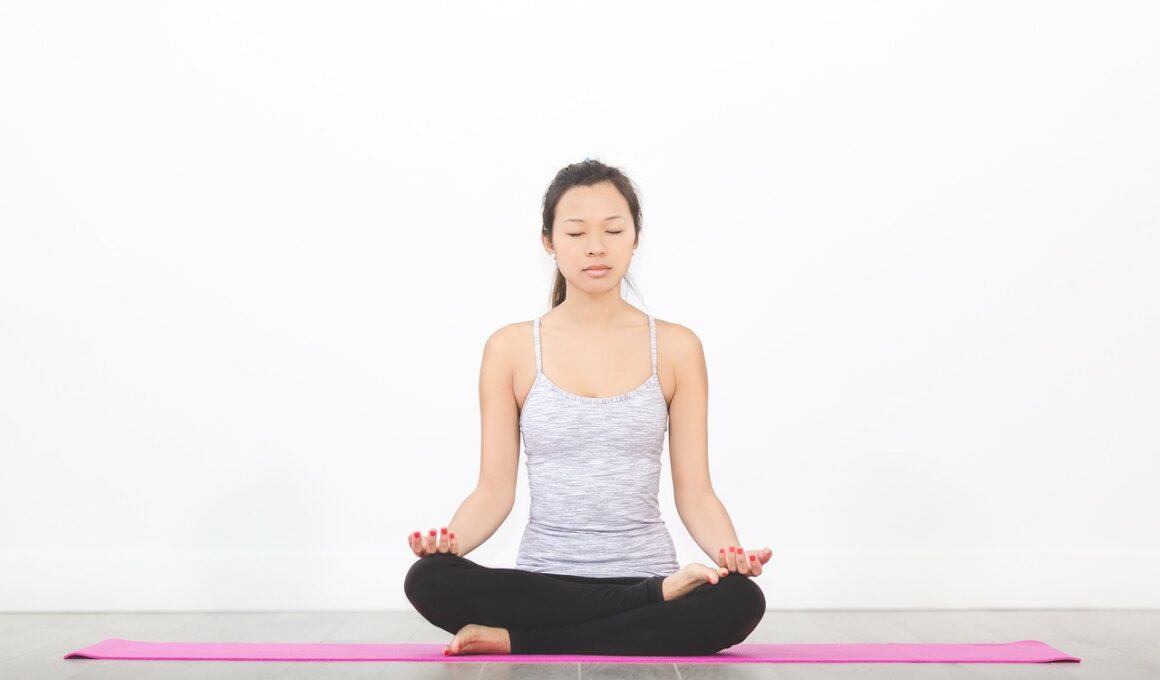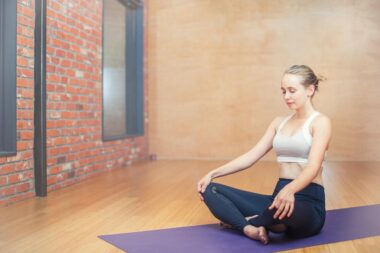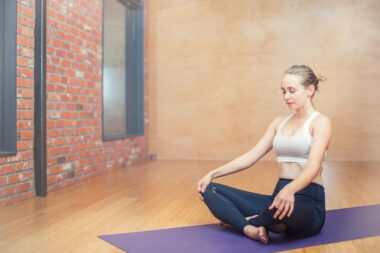Guided Meditation Practices for Athletes
In the realm of athletic performance, mindfulness and meditation play an increasingly vital role. Guided meditation practices can significantly enhance an athlete’s performance by promoting mental clarity and emotional stability. These practices help athletes manage stress and anxiety, leading to improved focus during competitions. Additionally, mindfulness techniques allow athletes to connect with their bodies, enhancing their physical awareness and improving reaction times. Through guided meditation, athletes learn to find a mental space where they can visualize success and prepare mentally for their performance. Incorporating these practices into daily training can result in increased resilience against the psychological pressures of competitive sports. As athletes learn to meditate, they build a toolkit of coping strategies that can be invaluable when facing intense competition. The benefits of these practices are backed by various studies showcasing how mental training can change brain chemistry, aiding in the reduction of performance anxiety. Thus, guided meditation becomes not just a tool but a partner in every athlete’s journey, combining mental and physical training to achieve peak performance. Practicing consistently can significantly influence an athlete’s mindset and overall success in their respective sports.
The Science of Mindfulness in Sports
Numerous studies reveal that mindfulness significantly impacts athletic performance. In essence, mindfulness is the practice of being present in the moment, which can lead to enhanced performance outcomes. This allows athletes to concentrate on their current actions without being distracted by past failures or future expectations. When athletes focus their mind on the present, they often experience decreased anxiety levels and increased confidence. Guided meditation also utilizes visualization techniques, which can be powerful for performers as they create mental images of success. Creating such mental imagery can enhance muscle coordination and performance, making it easier to execute skills under pressure. Furthermore, these practices develop a strong mind, essential for maintaining motivation during rigorous training schedules. Athletes become equipped to bounce back from failures, fostering a resilient spirit that has proven beneficial for long-term success. Implementing a structured meditation practice can improve not only physical capabilities but also the mental toughness required in competitive sports. It’s essential for athletes to understand the profound connection between mind and body, where mindfulness practices contribute to an overall enhancement of athletic capabilities.
Within the context of guided meditation, various techniques can help athletes discover what works best for them. These techniques may include breath awareness and body scan practices. In breath awareness, individuals focus on inhaling and exhaling. Focusing on breathing fosters calmness and centers the mind, enabling athletes to clear away distractions. The body scan technique, conversely, involves systematically bringing attention to different muscle groups. This practice helps with physical relaxation, reducing tension stored in the body. Moreover, utilizing affirmations during meditation can boost self-esteem and foster a positive mindset. By repeatedly affirming their abilities, athletes can strengthen their belief in themselves, crucial for high-stakes situations. Incorporating soundscapes or guided scripts during their meditation routines can further enhance the experience, enabling a deeper relaxation state. It’s essential to note that consistency plays a key role in realizing the benefits derived from these practices. Establishing a daily routine even for just 10-15 minutes can reap significant dividends over time. Hence, it becomes vital for athletes to experiment with various meditation forms to discover those that resonate with them and fit within their training regimens.
Overcoming Challenges with Mindful Practices
One significant challenge athletes face is performance anxiety, often leading to decreased performance levels. Mindfulness and guided meditation practices offer proven methods to combat these issues effectively. By dedicating time to meditation, athletes develop the ability to transform anxiety into focused energy. This transformation is vital during competitions where nerves can hinder performance. Mindfulness helps in recognizing anxious thoughts without self-judgment, allowing athletes to release pressure and focus on their craft. Studies have continually shown that athletes who practice mindfulness experience a higher level of emotional regulation, which aids in maintaining composure. Part of this emotional regulation involves techniques such as reframing stressful thoughts into more manageable narratives, allowing athletes to view challenges as opportunities for growth. Guided meditation can serve as a supportive tool in this regard by modeling positive self-talk and providing practical strategies to manage fears. Over time, athletes can observe a shift in their mental patterns, gaining a clearer perspective on challenges faced. Overall, guided meditation, combined with mindfulness, enables athletes to channel energy productively, overcoming performance anxiety and achieving desired outcomes on their competitive journeys.
A successful meditation routine doesn’t have to be elaborate. Athletes can tailor their practices to fit their personal preferences. For some, morning meditations are ideal, setting a positive tone for the day ahead. Others may prefer evening sessions to unwind after intense training or competitions. Adjusting the length of each session can also cater to different schedules; even a few minutes can make a difference. When creating a suitable meditation environment, it’s essential to minimize distractions, promoting a peaceful atmosphere conducive to cerebral focus. Athletes can enhance their practice with calming music or nature sounds, contributing to relaxation. Simultaneously, journaling after meditation can help athletes articulate their experiences, letting them track their mental growth and emotional journeys. Furthermore, engaging with a meditation coach or attending group sessions can bolster their practice, providing motivation and accountability. For athletes hesitant about meditation, engaging in physical activities like yoga can also introduce mindfulness. Yoga combines physical movement with breath awareness, serving as a nice introduction to the benefits of mindfulness in sports. Ultimately, creating a supportive and enjoyable meditation routine can lead to greater mental clarity and emotional well-being.
Integrating Mindfulness into Daily Training
Integrating mindfulness practices into daily training enhances the overall development of athletes. This integration can occur in various forms, such as incorporating breathing exercises into warm-up routines. These techniques can create a foundation for both mental and physical preparation. As athletes transition into more rigorous training, embedding mindful moments can ground their focus, instilling a sense of calm amidst chaos. Moreover, visualization can be practiced at any time. Athletes can visualize a successful performance during rest intervals or while cooling down after workouts. Regularly harnessing this mental imagery can build confidence while familiarizing them with different scenarios they may encounter in competitions. Coaches also play a vital role in encouraging the use of mindfulness techniques among their athletes. They can guide athletes through mindfulness practices leading to group manifestations of shared focus and unity within teams. This communal experience fosters relationships among team members, enhancing collaboration. Furthermore, mentoring relationships can be formed as athletes share personal experiences with anxiety and stress, creating a supportive network. Ultimately, emphasizing the importance of integrated mindfulness in training can generate significant benefits both on and off the performance field, enhancing competitiveness.
In conclusion, guided meditation practices have proven beneficial for athletes aspiring to enhance their performance. These practices foster an improved mental environment, leading to increased focus, reduced anxiety, and overall emotional stability. Moreover, these techniques have profound implications on athletes’ personal growth, supporting a healthy mindset and resilience against the demands of high-level competition. Athletes can explore a variety of meditation methodologies to develop those that resonate with them. The adaptability of these practices allows athletes to customize their routines for maximum impact, depending on their individual needs. With consistent practice, individuals can observe remarkable changes in their mental states and approaches to challenges in their sport. As mindfulness becomes more commonplace among athletes, the resulting mental shift has the potential to redefine their athletic journey. By integrating mindfulness into everyday routines, athletes not only unlock the power of focused performance but also enrich their overall life experiences, cultivating joy during the process. Ultimately, guided meditation forms a framework that champions an athlete’s journey towards excellence, promoting success through an aligned mind-body connection that can transcend competition.
By approaching meditation as a vital component of athletic training, athletes can maximize their performance potential. For those interested in exploring guided meditation further, numerous resources and apps are available to assist. These resources often include audio recordings and scripts designed specifically for athletes, providing structured sessions tailored to their needs. Athletes should consider the wealth of experienced practitioners offering online courses, workshops, or even one-on-one coaching sessions. Such offerings can perfect their exploration of mindfulness techniques and meditation practices. Additionally, engaging with communities or forums focused on mindfulness in sports can provide valuable insights and tips. Peer discussions can foster motivation and support among athletes also exploring guided meditation. Overall, tapping into the expansive resources available can provide athletes with new methods to incorporate mindfulness, further enhancing their overall approach to training and performance. As more evidence emerges supporting the benefits of mindfulness, athletes can be encouraged to embrace these practices as essential tools for success. Thus, it becomes apparent that guided meditation is not merely a supplementary training method but an integral part of an athlete’s holistic approach to excellence in their respective disciplines.





